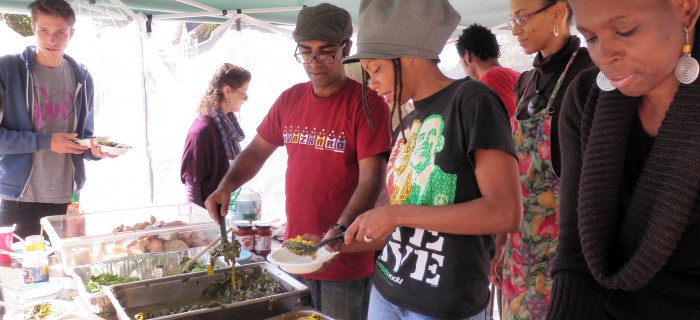Food System Meta-Analysis for the San Francisco Bay Area
March 2009, Development Report No. 19
Executive Summary
Over the past decade, more than 50 studies have examined food system and community food issues throughout the Bay Area. While all of the studies have an obvious element in common—food—each addresses different “sectors” of the food system, including food production, processing and distribution, consumption, and waste recovery. The design and intent of each study varies widely, making cross-comparisons difficult. Public Health Law & Policy (PHLP), in collaboration with Food First, developed this Bay Area Food System Meta-Analysis to provide an overview of the work that has been done and draw some meaningful conclusions to inform future research and action on food system issues.
We reviewed 38 studies, ranging from resident surveys and statistical summaries to full food system assessments. We also interviewed key informants involved in Bay Area food system work to get a clearer sense of how research has affected on-the-ground action and policy change. A number of major findings emerged:
- Few studies to date have used a “food system” framework to approach food security, food retail, or other community food issues. The absence of this framework signifies a historic lack of understanding or emphasis on how problems in one sector of the food system (such as a lack of grocery stores in low-income neighborhoods) are connected to broader systemic patterns and trends.
- The vast majority of Bay Area studies have focused on only two counties. While communities throughout the Bay Area clearly experience many of the same dynamics when it comes to the food system, the knowledge and practical experience some counties have developed is not necessarily accessible regionally. A regional constituency for food system policy change could bring more political capital and focus to these issues and highlight where resources could be shared or leveraged.
- The most commonly addressed sector of the food system was consumption, with a focus on food security, food access, and public health. Nearly every study analyzed here addressed consumption in some way. This indicates a primary emphasis on food access, often at the expense of considering larger questions of food system organization and policy.
- Community participation in the policy-making and program planning process, especially youth involvement, is tremendously important. The role of schools, planning departments, and other groups that engage residents in planning, education, and program development is critical in creating opportunities for residents to work toward change across the food system.
- Surprisingly few studies included policy recommendations to address their findings and observations. While programmatic and other recommendations are likely useful for organizations engaged in this work, without explicit policy recommendations, the information generated through food system assessments is unlikely to redirect public and private resources or otherwise inform environmental or policy change.
- The Bay Area needs a strong regional constituency to improve collaboration and follow up on recommendations, and to establish political will at the local, regional, state level to address the needs of our food system. Whether formal or informal, regional dialogue among existing food system advocates and researchers (as well as new partners) could help target future research to identified gaps, improve the effectiveness of research at creating policy change, and foster regional innovation.
We have compiled these findings to foster a clearer understanding of existing food system assessments, and to identify where and how they have been used effectively to create community change. We hope this report serves to further the work of the many advocates and stakeholders whose efforts we have analyzed here.


 Help Food First to continue growing an informed, transformative, and flourishing food movement.
Help Food First to continue growing an informed, transformative, and flourishing food movement.




